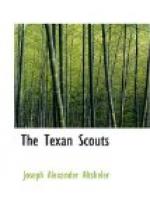The letter was laid before the convention, and the excitement was great and irrepressible. The feelings of these stern men were moved deeply. Many wished to adjourn at once and march to the relief of the Alamo, but the eloquence of Houston, who had been reelected Commander-in-chief, prevailed against the suggestion. Then, with two or three men, he departed for Gonzales to raise a force, while the others elected Burnet President of the new Texas, and departed for Harrisburg on Buffalo Bayou.
“Deaf” Smith and Henry Karnes did not go just then with Houston. They were scouts, hunters and rough riders, and they could do as they pleased. They notified General Sam Houston, commander-in-chief of the Texan armies, that they would come on later, and he was content.
When the Texan government and the Texan army, numbering combined about a hundred men, followed by most of the population, numbering fifty or sixty more, filed off for Gonzales, the two sat once more on the same porch, smoking their cob pipes. They were not ordinary men. They were not ordinary scouts and borderers. One from the north and one from the south, they were much alike in their mental processes, their faculties of keen observation and deep reasoning. Both were now stirred to the core, but neither showed a trace of it on his face. They watched the little file pass away over the prairie until it was lost to sight behind the swells, and then Smith spoke:
“I reckon you an’ me, Hank, will ride toward the Alamo.”
“I reckon we will, Deaf, and that right away.”
Inside of five minutes they were on the road, armed and provisioned, the best two borderers, with the single exception of the Panther, in all the southwest. They were mounted on powerful mustangs, which, with proper handling and judicious rests, could go on forever. But they pushed them a little that afternoon, stopped for two hours after sundown, and then went on again. They crossed the Colorado River in the night, swimming their horses, and about a mile further on stopped in dense chaparral. They tethered the mustangs near them, and spread out their blankets.
“If anything comes the horses will wake us,” said Smith.
“I reckon they will,” said Karnes.
Both were fast asleep in a few minutes, but they awoke shortly after sunrise. They made a frugal breakfast, while the mustangs had cropped short grass in the night. Both horses and men, as tough and wiry as they ever become, were again as fresh as the dawn, and, with not more than a dozen words spoken, the two mounted and rode anew on their quest. Always chary of speech, they became almost silence itself as they drew nearer to San Antonio de Bexar. In the heart of each was a knowledge of the great tragedy, not surmise, but the certainty that acute intelligence deduces from facts.
They rode on until, by a simultaneous impulse, the two reined their horses back into a cypress thicket and waited. They had seen three horsemen on the sky line, coming, in the main, in their direction. Their trained eyes noticed at once that the strangers were of varying figure. The foremost, even at the distance, seemed to be gigantic, the second was very long and thin, and the third was normal. Smith and Karnes watched them a little while, and then Karnes spoke in words of true conviction.




